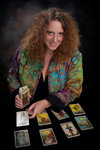The Community Sandbox
 I love being part of a community. What I mean is, I love being with like-minded people. I love working with others to create meaningful social experiences. I especially love it when those experiences involve creativity, spirituality, charity or political activism.
I love being part of a community. What I mean is, I love being with like-minded people. I love working with others to create meaningful social experiences. I especially love it when those experiences involve creativity, spirituality, charity or political activism.
I believe that, through building strong community, we can, and will, manifest the vision of healing. Healing for individuals, communities and the planet is, for me, why we gather in community. Yes, I am an idealist. At 48 years old, I still believe we can make the world a better place.
I have been a member of many communities. These include (but are not limited to) the Rainbow Family, the tarot community, the United Methodist Church, various arts, music and theatre communities, the naturist community, the drum circle community, the Pagan community, and various activist communities.
The internet has created global community, where once only local and traveling communities existed. The internet allows us to say things to each other that we wouldn’t say face-to-face, causing hurt and disunity. For building community, the internet is both our greatest tool and largest liability.
As close as I can figure as I research it, the word community comes from the Latin, “common unity.” That’s nice.
When looking at the list of communities of which I have been a part, one might ask, what do all of these have in common? I mean, other than eclectic me, of course.
Sadly, the answer is what I sometimes call The Sandbox, or The Kindergarten.
It seems that, whenever well intentioned, intelligent people gather together to build community, there will always be politics, carried out with the finesse of kindergarteners fighting in the sandbox.
Recently, my own drum community endured such shenanigans. I have seen the global tarot community grapple with numerous blown-out-of-proportion scandals. The Pagan community has had so much trouble with infighting that they have coined an accepted expression to describe it: “Witch Wars.”
That so many of the communities most troubled by political infighting are spiritual communities, or communities formed to promote wonderful ideals, is surprising, and disillusioning, to many.
The sandbox is always more unpleasant when money is involved, and money is always involved.
Also always involved are ego, and dogma.
Money, ego and dogma are also usually the reasons we fight wars. I’m grateful that drummers are only armed with drums, and tarot readers are only armed with their cards.
I have often seen leaders who have earned the respect of their community diminish that respect by refusing to let the communities they lead develop organically. Those leaders often make seemingly arbitrary decisions about who can play in the sandbox, and who cannot. They often make rules about how things need to be, and spend a great deal of time issuing edicts in the form of mass emails, blog posts and the like. I know it is ironic that I am doing that same thing here.
If we could learn to play nicely in the sandbox, or to leave the sandbox entirely, we could evolve into people able to pave the way for peace. Transversely, if a community of laid-back drummers on their way to Burning Man can’t act peaceably with one another, I don’t see much hope for the Middle East.
The problem is this. The very thing that drives a person to devote their time and energy organizing, teaching and leading community is the very thing that can make a community leader possessive, didactic and controlling.
Every community will grow beyond the boundaries set by its organizers. A true leader will see that their ultimate goal is to replace themselves – in essence, to work themselves out of a job. True leaders delight when their community develops a heartbeat of its own.
I think problems often come when community leaders link their personal sense of identity too closely with the community they helped to created. Parents often do the same thing with their children.
When the community starts to develop into something with its own mind and heart, leaders have a choice.
We can maintain control at all costs, and limit the community to our own idea of what it should be.
Or, we can step back and gently guide, watching from the sidelines as the community develops into something greater than we could have ever imagined.
Because many leaders have their money, ego, dogma and identity so heavily investing in their community, this process is excruciatingly difficult.
What happens instead is, out of fear, the leader has a tendency to over-control, to dictate and to over-steer.
If we, as community leaders, can think more like healthy, proud parents and less like greedy politicians, our communities will thrive and grow.
If we can nurture a strong sense of personal identity that is separate from the community we are building, we will be less likely to panic as the community grows and changes. We will be less likely to react when we see things differently from the community members that support us.
Communities exist to assist in the healing of their members. People in search of healing are not always on their best behavior.
Each community must nurture compassion more than condemnation, and understanding more than exclusion. It is up to the leaders of each community to set that standard, and teach it by example.
We must all check our egos at the door, feel secure in our income and reputation, recognize the divisive nature of dogma, and separate our own sense of identity from the identity of the communities we support.
Only then will we graduate from the sandbox, and fulfill our vision for the planet.
